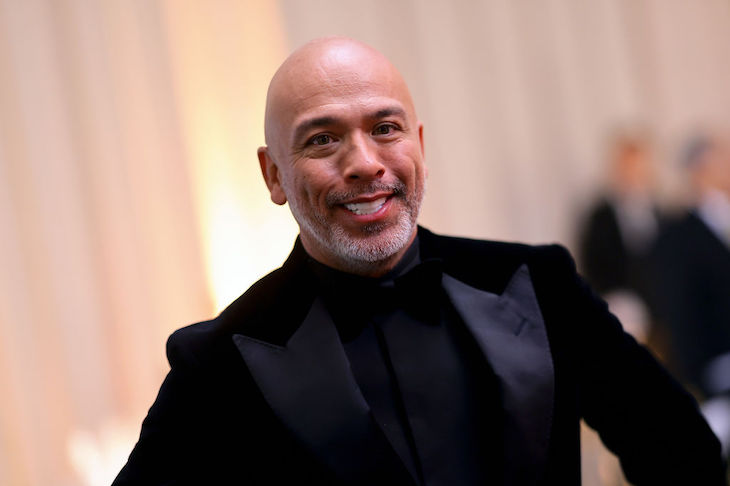Does anybody actually watch televised Hollywood award shows anymore unless, like me, they’re being paid to? Until ‘The Incident’ at the 2022 Oscars between Will Smith and Chris Rock, the answer was clear; between 2014 and 2020, even the Academy Awards lost almost half their audience, which fell to 23 million. But in 2023, figures were up by a whopping 18 million as eager punters tuned in, perhaps hoping to see a spot of ‘bitch-slapping’ between Cate Blanchett and Michelle Yeoh.
The Golden Globes, lacking the iconic oomph of the Oscars, has fared even worse, despite being a broader church in that they cover the year’s top televisual as well as cinematic achievements. In 2019, they had a respectable 19 million viewers; last year, that was down to a derisory 6 million – the lowest figures since NBC began broadcasting them in 1996. They’re awarded by the Hollywood Foreign Press Association, who might be seen to be impartial, rather than judged by peers, as the Oscars are – leaving space for speculation that scores might thrillingly be settled in the latter case.
It took a Brit presenter, Ricky Gervais, to cut these preposterous poseurs down to size
What the GGs do have going for them is that they’re the first up in the awards season, thereby setting the pace and predicting where the Oscars might go. As befits a shindig organised by hacks, they have a reputation as the party animal of the group, compared to the scolding seriousness of the Oscars. The 81st Golden Globes – dumped by NBC after last year’s disastrous figures, now picked up by CBS – will see a thousand showbiz kids packed into a smallish room at the Beverly Hills Hilton, scoffing sushi from Nobu, with each table holding a wet bar in its centre; for the first time ever, a bar is promised on the actual red carpet leading in to the ceremony, just in case Natalie Portman can’t wait until she sits down for that first Buckfast of the night.
Hedonism and high-octane relief are often hard to tell apart and these have been a rocky few years for Hollywood, what with lockdown and the writers/actors strike. Add to this the always popular double act of Inc(lusivity) & Div(ersity) – which led to last year’s dismantling of the all-white jury in favour of a voting body which is now ’47 per cent female with 60 per cent self-identifying as racially and ethnically diverse: 26.3 per cent Latinx, 13.3 per cent Asian, 11 per cent Black, and 9 per cent Middle Eastern’ – and you’ve got the conditions for an excellent party, fuelled equally by cocaine and self-righteousness; one of the best combinations for a damn good night out, in my experience. But this being money-mad Hollywood, nods to integrity will come with a knowing wink to the real meat of the matter; a new category for films which is explicitly about how much money they’ve made, pitting eight films which have pulled in at least $150 million (£120 million) against each other. This may well be a tribute to the fact that 2023 was the year of that omnivorous Pushmi-Pullyu of the cinematic art, Barbenheimer, in which 20th century culture was summed up by a plastic doll and a scientist capable of destroying civilisation as we know it.
But Barbenheimer was a blip. In 1930, 65 per cent of Americans went to the cinema weekly – now 4 per cent do. We still watch films, but no longer in reverent silence in public places of worship; instead we mock them, pause them and sexually gratify ourselves over them in the privacy of our homes. Modern film stars know this; it stings to be merely a component of an evening’s entertainment alongside Deliveroo. As the importance of cinema has dwindled, the po-faced self‑importance of the film industry has grown; as David Cox wrote in The Spectator in 2019:
‘This is not the first time that cinema has subordinated aesthetic endeavour to promoting the ideology of the ruling elite. Yet now it is not supporting the war effort, or plugging the GPO’s mail service. It is insidiously advancing identitarian attitudes that threaten to deepen social division. For that, it deserves no awards.’

The sight of individuals who had the same chance as everyone else to become nurses or firefighters, but chose instead to go into a business that is about playing pretend and reaping vast financial rewards for it, lecturing the rest of us on how to be good people would be offensive if it wasn’t so funny. It took a Brit presenter – Ricky Gervais in 2010, 2011, 2012, 2016, and 2020 – to cut these preposterous poseurs down to size; his final year was his best when, after sitting through speeches by Jennifer Aniston on climate change and Patricia Arquette on USA/Iran relations, he announced:
‘You know nothing about the real world. Most of you spent less time in school than Greta Thunberg…If you do win an award tonight, don’t use it as a platform to make a political speech.’
He went on to say of the length of Once Upon A Time In Hollywood that ‘by the end, Leonardo DiCaprio’s date was too old for him’ and that ‘We were going to do an In Memoriam this year, but when I saw the list of people who died, it wasn’t diverse enough.’
Instead of Gervais, an amiable-looking Filipino-American called Jo Koy was the Woke choice; the only joke I’d previously heard of his was a military-bashing one, implying that inter-racial marriages in the USA have generally taken place between supplicant natives and invading Yanks – just what a bitterly divided nation needs right now. There has literally never been a funny Woke comedian, and Koy was no exception; he even told an unamusing joke about the Sussexes – they ‘got paid millions for doing absolutely nothing – and that’s just by Netflix’ – which I would have thought impossible.
To be fair, though, there weren’t many lectures this year; instead, Florence Pugh’s nipples did the talking. I believe that I could pick them out of a police line-up by now, but it’s always a pleasure to see this beautiful and tough young actress strutting her stuff; she doesn’t resemble the other female stars she poses with, looking like a beautiful Shetland harassed into harness with a line-up of skinny show-ponies who’d been given a dash of Ozempic in their nose-bags.
But neither was it as lively as before; Gervais won the first ever Best Stand-Up for Armageddon but didn’t both turning up to collect it. He was missed – as was wit of any kind. I felt that those actors who were there – with the exception of the modern and defiant Pugh – seemed in some way to be ghosts, of the Hollywood Golden Age, perhaps. As with the Love Island kids, Covid has wrung the unscripted bantz out of the beautiful.

‘I burped,’ said Succession winner Kieran Culkin, after burping; the audience howled as if Dorothy Parker walked among them. Accepting the Cash Cow Award – sorry, Box Office Achievement Award – for Barbie, Margot Robbie dedicated it to ‘Every single person who went to the greatest place on earth – the movie theatres.’ Steady on, Sheila!
But the wit James Maker calls Hollywood award shows ‘hen-parties for virtue signallers’ and it wouldn’t have been a proper beano without a bit of tearful id-pol; Lily Gladstone, the first Native-American winner, said: ‘This is an historic win. It doesn’t belong to just me. It belongs to my sisters and my mothers; I’m standing on all of your shoulders.’ I know this phrase is meant to be respectful but I always think of one of those human pyramids, with the most determined of the group scrambling heedlessly to the top, not caring how many faces their bum gets stuck into on the way.
And that’s why Hollywood and Woke is such a silly combo. No matter what Gladstone’s origins, she will now be part of the aristocracy of a state with one of the most savage socio-economic divides in the USA, driven by the entertainment industry. Though it’s all bubblegum pink laughs and lollipops now, when America catches fire again – and it will, with such an uncivil election on the way – who’s to say that the mansions of Malibu won’t get the January 6 treatment that Capitol Hill did in 2021, no matter how much they advocate for Inc & Div? Though Barbie took Best Song, I kept thinking of an older tune by Neil Young, called Revolution Blues:
‘We live in a trailer at the edge of town
You never see us ’cause we don’t come around
We got twenty five rifles just to keep the population down…
it’s so good to be here, asleep on your lawn
Remember your guard dog?
Well, I’m afraid that he’s gone…
I got the revolution blues, I see bloody fountains
And ten million dune buggies comin’ down the mountains
Well, I hear that Laurel Canyon is full of famous stars
But I hate them worse than lepers and I’ll kill them in their cars…’
Hollywood seems at ease with itself again after a period of turmoil – smug, even. But this new upbeat mood may carry the seeds of its own destruction; remember how The Day Of The Locust – originally called The Cheated – ended? It’s odd how a bunch of people so conscious of concepts of privilege can be so unconscious of having the greatest privilege possible; doing something one loves for a living. It would behove Hollywood – in the interests of its own survival, if nothing else – to remember this.
This article is free to read
To unlock more articles, subscribe to get 3 months of unlimited access for just $5








Comments
Join the debate for just £1 a month
Be part of the conversation with other Spectator readers by getting your first three months for £3.
UNLOCK ACCESS Just £1 a monthAlready a subscriber? Log in